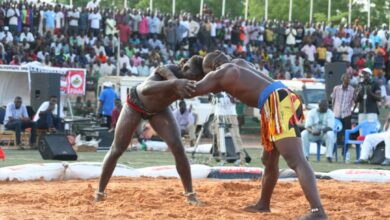Afrobeat vs Afrobeats: Everything You Need To know About Africa’s Biggest Music Export

In reality, there exists no genre named “Afrobeats.” The authentic and enduring genre is Afrobeat, pioneered by Fela Kuti and handed down through generations as an emblem of African identity.
Pop music originating from Africa and created by Africans for global audiences is appropriately termed “Pop Music.”
In recent times, the term ‘Afrobeat’ has acquired a new interpretation internationally, owing to the surge of African pop music and the widespread inclination of international pop artists to draw inspiration and direction from it.
Collaborations like Wizkid with Drake and Kyla on the chart-topping ‘One Dance’ and Alicia Keys’ incorporation of drum elements from Nigerian Afrobeat music in her single ‘In Common’ exemplify the global influence of African sounds.
Yet, amid these developments, a considerable portion of the audience has conflated the true meaning of ‘Afrobeat’ with a misnomer coined in the UK—’Afrobeats’ (with an ‘s’)—giving rise to the Afrobeat vs Afrobeats debate.
ALSO READ: Burna Boy Biography – Afrobeats Legend Awards, Albums, Networth, Songs, Personal Life
Burna Boy Biography – Afrobeats Legend Awards, Albums, Networth, Songs, Personal Life
Afrobeat
When Fela Anikulapo Kuti, the originator of Afrobeat, introduced this distinct and unadulterated genre in late 60s Nigeria, its profound impact on the global stage was unforeseen.
Afrobeat, a fusion of traditional Nigerian and Ghanaian music, jazz, highlife, funk, and chanted vocals, emerged as a groundbreaking genre popularized in Africa during the 1970s.
Fela Kuti, the visionary multi-instrumentalist, coined the term Afrobeat and played a pivotal role in spreading the genre beyond Nigeria.
Afrobeat, at its zenith, encompasses orchestrated music from a diverse array of instruments, including saxophones, rhythm guitars, trumpets, bass guitars, drums, trombones, organs, and various percussion instruments.
Artists faithfully adhering to the original Afrobeat genre include Femi and Seun Kuti, Segun Bucknor, Tony Allen, and other Afrobeat bands and musicians.
ALSO READ: Wizkid Biography: Afrobeats Legend Awards, Albums, Networth, Songs, Personal Life
Wizkid Biography: Afrobeats Legend Awards, Albums, Networth, Songs, Personal Life
Afrobeats
On the other hand, the term ‘Afrobeats’ was coined by London DJ Abrantee in the UK. It represents a reductionist neologism created to categorize African popular music that melds 21st-century influences of western rap with contemporary Ghanaian and Nigerian pop music.
This evolving sound captures the up-tempo African vibe and resonates with young, vibrant Afropolitan minds.
The resulting music, characterized by a fusion of beats and influences, has gained immense popularity globally, with technology playing a significant role in its widespread dissemination.
The export of this new sound is not solely reliant on technology but also involves the contribution of African diaspora communities, which actively contribute to the propagation of pop sounds originating from their home countries.
ALSO READ: 100 years of Afrobeat & Pop Music in Nigeria
100 years of Afrobeat & Pop Music in Nigeria – Africa Facts Zone
Afrobeat Vs Afrobeats: Unraveling the Distinction
In the course of time, these musical genres have gained substantial prominence, with tracks like D’banj’s ‘Oliver Twist’ and 2face Idibia’s ‘African Queen’ dominating international music charts.
More recently, Wizkid’s ‘Ojuelegba’ made significant inroads into Western radio, culminating in a noteworthy collaboration with Drake.
Afrobeats, as portrayed in the Western narrative, is not a distinct genre. Instead, it is a term used to describe the vibrant pop music emanating from burgeoning African music hubs such as Nigeria, Ghana, Congo, South Africa, and others.
Consider this: when pop music is crafted in America by artists like Justin Bieber, it is simply termed ‘Pop.’ Similarly, when synthesized in Europe by the likes of Adele, Nico & Vinz, and others, it is universally recognized as pop music.
Why then do we feel the need for the term ‘Afrobeats,’ which erroneously pigeonholes African musicians into a fabricated misnomer that undermines their creative input? Icons like Davido, Wizkid, Tu Baba, and many others create pop music rooted in the influences of their respective home countries.
Their potential to rival and surpass pop acts worldwide should not be underestimated. Therefore, labeling their work and confining it to a non-existent genre is restrictive and fails to accurately categorize their diverse sounds.
To reiterate, there is no distinct Afrobeats genre. There is only Afrobeat, a genre originated by the legendary Fela Kuti, perpetuated through generations as a profound African identity.
Pop music in Africa, crafted by Africans for a global audience, is simply ‘Pop Music.’ It is crucial for us to share our African narrative and present a unified story for our music, our sounds, and our art.
Without this, foreign misrepresentations may proliferate and be imposed upon us. Afrobeats serves as a clear example of such misinterpretations.
ALSO READ: Davido Biography – Afrobeats Legend Awards, Albums, Networth, Songs, Personal Life
Davido Biography – Afrobeats Legend Awards, Albums, Networth, Songs, Personal Life
Afrobeats Artists
In the vast landscape of Afrobeats, numerous artists are churning out infectious tunes that set the dance floor ablaze.
While it’s impossible to encompass every talent, especially for those venturing into the genre, there are a few acclaimed artists to kickstart the journey, with a plethora more waiting to be explored.
Wizkid, propelled to global recognition with the chart-topping “One Dance,” has a musical journey that extends well beyond that singular hit.
His 2011 debut album, “Superstar,” garnered immediate acclaim, setting the stage for numerous hit singles.
Wizkid’s popularity skyrocketed in 2014 when he became the first Nigerian musician to amass over a million followers on Twitter, earning him the moniker “Star Boy” and solidifying his status as one of the most iconic Afrobeats artists.
Tiwa Savage, a trailblazing female Afrobeats singer from Nigeria, navigated the male-dominated music scene to establish herself as a leading figure in the genre.
Overcoming obstacles, she stands out as one of the most prominent Afrobeats artists today, even clinching the title of Best African Act at the 2018 MTV Europe Music Awards.
Davido’s rapid ascent to fame began in 2011 with his debut album, “Omo Baba Owolo,” and continued with the success of his second album, “The Baddest.”
A trailblazer, he secured the Best International Act at the BET Awards in 2014 and 2018, being the first African artist to personally receive the honor on the BET stage.
Among other notable artists in the Afrobeats realm are Burna Boy, Mr. Eazi, Tekno, and 2baba, each contributing their unique flair to the genre.
A curated playlist featuring these artists and more can be explored on Quartz’s Afrobeats playlist on Spotify.
ALSO READ: Nigerians Who Broke Guinness World Records: (Wizkid, Davido, Burna Boy)
Nigerians Who Broke Guinness World Records: (Wizkid, Davido, Burna Boy)
Tackling Piracy
Despite the surging popularity, many Afrobeats artists grapple with turning their musical success into financial gains.
Piracy, the illicit sale of an artist’s work, remains a pervasive challenge, hindering the ability to profit from music sales.
To navigate this hurdle, artists often turn to alternative revenue streams, such as live performances, endorsements, and digital streaming.
Ringback tones have also emerged as a lucrative avenue, allowing users to choose a song for callers to hear instead of the traditional ringtone, generating over US$100 million in Nigeria’s music market where streaming services may not be as widely available.
The Path Forward for Afrobeats
The future for Afrobeats looks promising, with major players like Sony Music and Universal Music Group establishing offices in Lagos.
Their aim is to sign local artists and amplify their success while actively combating piracy. This move is anticipated to fortify legal ownership and rights over the music, ensuring a more sustainable and lucrative future for Afrobeats artists.
Having carved their path to international acclaim independently, Afrobeats artists are now poised for even greater heights with the backing of major music labels.
The spotlight is firmly on them, and the future is undoubtedly one of continued ascendance.




